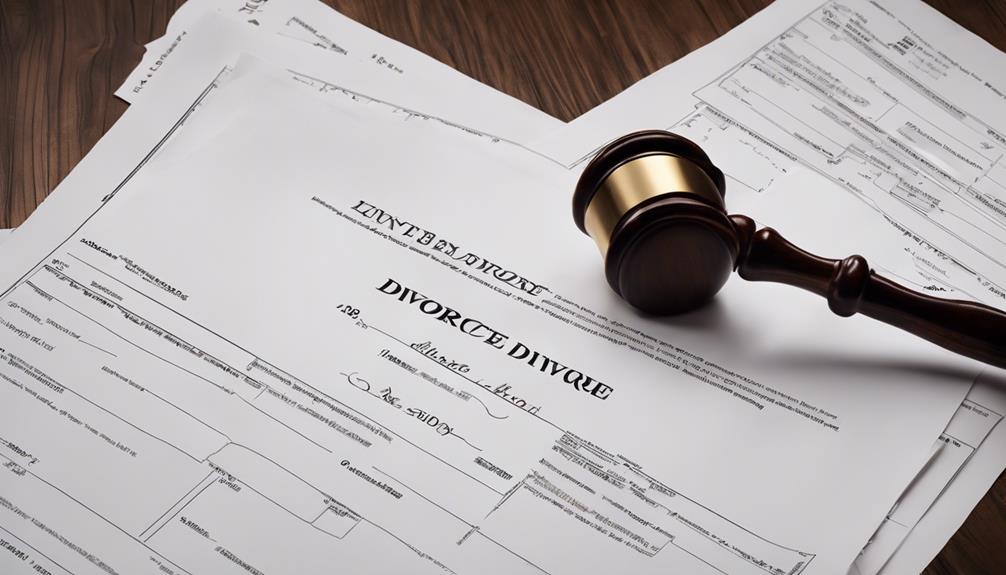Handling a contested divorce in Texas involves specific procedures. To start, you must file the Original Petition and ensure it is served at least 45 days before the trial through a process server, constable, or certified mail. It is crucial to respond to the petition within 20 days to avoid delays. Secure temporary orders for important matters and contemplate mediation for a more affordable resolution. Familiarize yourself with trial preparation, presenting evidence, and the possibility of appeals. It is advisable to seek legal assistance to navigate through this intricate process effectively. For detailed guidance on each step of contested divorce in Texas, explore further.
Key Takeaways
- File Original Petition for Divorce accurately and promptly.
- Serve divorce papers using a process server, constable, or certified mail.
- Obtain temporary orders for child custody, support, and property.
- Understand trial procedures and present evidence effectively.
- Seek legal representation and adhere to appeal deadlines.
Understanding Texas Divorce Process
When managing a contested divorce in Texas, understanding the Texas divorce process is essential for effectively addressing key issues such as asset distribution, child custody, and support arrangements. In Texas, the legal process for a contested divorce begins with filing an Original Petition for Divorce in the county district court. This initiates the proceedings where judicial intervention becomes necessary due to disagreements between spouses. Understanding Texas Family Law is critical as it recognizes fault-based and no-fault grounds for divorce, impacting property division and support arrangements.
In contested divorces, the differences between asset division, property division, and child custody can be complex and require guidance from legal professionals well-versed in Texas Divorce laws. Distinguishing between contested and uncontested divorces is essential as it influences how the legal process unfolds. By familiarizing ourselves with the intricacies of the contested divorce process in Texas, we empower ourselves to navigate these challenging circumstances knowledgeably and with confidence.
Filing Petition and Serving Papers

Filing an Original Petition for Divorce in Texas is the first step to begin a contested divorce.
Serving divorce papers is vital and must be done at least 45 days before the trial.
Options for serving papers include a process server, constable, or certified mail.
Filing the Petition
To start a contested divorce process in Texas, the first important step is filing the Original Petition for Divorce with the county district court where the couple resides. This petition officially initiates the divorce proceedings and outlines the grounds for the divorce, such as insupportability, adultery, or cruelty. It's vital to make sure that the petition is accurately completed and filed according to the court's requirements.
Once the petition is filed, the next step involves serving the divorce papers to the other spouse. This process, known as service of process, is crucial to inform the respondent about the divorce proceedings. Proper filing and service are fundamental aspects of starting a contested divorce in Texas, setting the stage for further legal actions.
Serving Legal Papers
Once the Original Petition for Divorce has been filed in Texas, the next vital step is serving the legal papers on the other spouse. This process involves providing the respondent with a copy of the petition, ensuring they are officially notified of the divorce proceedings. Texas law mandates a 45-day notice period before the final trial can take place, allowing both parties ample time to prepare. Typically, the service of papers is carried out by a process server or constable, professionals trained in delivering legal documents. After being served, the respondent has 20 days to file an Answer to the Petition in a contested divorce case. This step is essential for both parties to move forward in the divorce process.
| Key Points | Details |
|---|---|
| Legal Papers | Serve Respondent |
| 45 Days Notice | Before Final Trial |
| Process Server | Or Constable |
| Respondent's Answer | Within 20 Days |
Navigating Service of Process
When it comes to handling service of process in a contested divorce in Texas, it's vital to make sure that all documents are served correctly. Understanding the legal requirements surrounding service is essential to prevent delays in the divorce case.
Proper service can be achieved through methods like a process server, constable, or certified mail.
Properly Serving Documents
Properly serving divorce documents in Texas necessitates strict adherence to specific legal procedures and rules, guaranteeing delivery to the respondent within the designated timeframe of 20 days by an authorized individual like a process server or constable. To help you understand this essential step, we've provided a table below outlining key points in managing service of process:
| Key Points | Description |
|---|---|
| Service of Process | Delivery of legal documents to the respondent |
| Authorized Individual | Process server or constable authorized to serve documents |
| Specific Legal Rules | Adherence to Texas laws governing document serving |
| Compliance | Following legal requirements for serving divorce documents |
| Required Time Frame | Documents must be delivered within 20 days to the respondent |
Following these guidelines ensures the proper delivery of documents, avoiding delays and complications in your divorce process.
Understanding Legal Requirements
Understanding the legal requirements for service of process in Texas is an important step in advancing with a contested divorce. To navigate service of process efficiently, consider the following key points:
- Vital Notification: Service of process ensures the respondent is informed of the divorce petition and proceedings.
- Authorized Servers: In Texas, service can be conducted by a process server, constable, or sheriff.
- Avoiding Delays: Correctly serving the respondent is essential to prevent delays in the divorce process.
- Legal Compliance: Adhering to Texas' specific legal requirements for service of process is essential for a contested divorce to proceed smoothly.
Temporary Orders in Divorce

Managing a hotly contested divorce in Texas involves obtaining temporary orders to address critical issues such as child custody, support, and property use during the divorce process. These orders are vital in guaranteeing that both parties' rights are safeguarded while the final resolution is pending.
Temporary orders hearings are conducted to establish guidelines for child support, visitation schedules, financial situations, property use, and other urgent matters. They serve to uphold stability and structure during the divorce proceedings. It's imperative to adhere to these orders carefully to protect your interests and secure a fair outcome.
If circumstances change, temporary orders can be adjusted to reflect new information or needs that arise. By following these orders, you can navigate the divorce process with clarity and purpose, setting the stage for a smoother progression towards the final resolution.
Integrating Mediation in Process

Incorporating mediation into the divorce process can greatly streamline communication and negotiation between spouses in a contested Texas divorce. When considering mediation in a contested divorce in Texas, here are four essential points to keep in mind:
- Court-Ordered Process: Mediation in Texas contested divorces is often court-ordered to assist couples in resolving disputes outside of a trial setting.
- Neutral Mediator: A neutral mediator facilitates discussions between spouses, helping them reach agreements on critical issues such as child custody, support, visitation schedules, and the division of assets and debts.
- Efficient Resolution: Mediation offers a cost-effective and efficient method to settle disagreements in a more amicable and collaborative manner, potentially avoiding the need for a lengthy and costly trial.
- Mutually Acceptable Settlement: Successful mediation outcomes can lead to a mutually acceptable divorce settlement, providing a more personalized and tailored resolution for both parties.
Child Custody Evaluations and Beyond

Child custody evaluations in Texas play an essential role in determining parental fitness and the well-being of the child involved. Evaluating factors such as parenting skills, mental health, and the quality of relationships with the child, evaluators aim to recommend custody arrangements that serve the best interests of the child. Through interviews, observations, and psychological assessments, valuable information is gathered to inform the evaluation process. Ultimately, the final custody decisions often align closely with the recommendations outlined in the evaluation report.
These evaluations are critical in contested divorces as they provide an objective evaluation of each parent's ability to care for the child. By focusing on the child's needs and welfare, the evaluation process aims to create custody arrangements that promote a healthy and supportive environment for the child's growth and development. Understanding the significance of these evaluations can help navigate the complexities of child custody disputes in Texas.
Contested Final Hearing and Trial

Preparing for the contested final hearing and trial in Texas requires thorough examination of evidence and strategic presentation to the judge. Here are some key points to contemplate:
- Understanding the Trial Process: Familiarize yourself with the court procedures and what to anticipate during the contested final hearing to be better prepared.
- Presenting Evidence Effectively: Compile and organize all relevant evidence to support your case, ensuring it's presented clearly and persuasively.
- Importance of Witness Testimonies: Witnesses can provide vital testimony to strengthen your arguments, so choose them wisely and prepare them thoroughly.
- Impact of Judges' Decisions: Be aware that the judge's decisions during the final trial will determine vital aspects such as child custody arrangements and asset division.
Appeal of Divorce Decree

When considering an appeal of a divorce decree in Texas, it's important to adhere to the 30-day filing deadline following the final judgment. Grounds for appeal may include legal errors, procedural missteps, or the introduction of new evidence.
It's advisable to seek legal representation to navigate the complexities of the appeal process effectively.
Decree Appeal Process
Upon finalization of a divorce in Texas, parties have the option to challenge the court's decisions through the decree appeal process.
- Errors in Law or Fact: Grounds for appeal may include mistakes in legal interpretation or factual findings by the trial court.
- Specific Timeframe: Appeals must be filed within a set period after the final decree is signed to be considered valid.
- Appellate Courts Review: The appellate courts assess the trial court's decision based on the case record presented.
- Potential Modifications: Successful appeals can lead to alterations in the original divorce decree, affecting aspects like child custody, support, or property division.
Grounds for Appeals
Challenging a divorce decree in Texas hinges on identifying legal errors or procedural missteps that occurred during the original trial. Grounds for appeals may include violations of due process, errors in property division, or mistakes in child custody determinations. Appellate courts review trial records to assess if errors warrant overturning the original divorce decree. Appeals must be filed within a specific timeframe after the final judgment to be considered by the appellate court. Successful appeals can result in modifications to the original divorce decree or a new trial being ordered.
| Grounds for Appeals | Examples of Issues |
|---|---|
| Legal Errors | Violations of due process |
| Improper Procedures | Errors in property division |
| Original Trial | Mistakes in child custody determinations |
Legal Representation Requirements
Legal representation plays a pivotal role in maneuvering the appeal process for a divorce decree in Texas. When contemplating appealing a divorce decree, hiring an experienced family law attorney is essential to navigate the complexities of the legal system effectively.
Here are some key points to ponder:
- Timely Filing: Make sure the notice of appeal is lodged within 30 days of the final judgment.
- Statement of Facts: Present a clear statement of facts and issues for review by the appellate court.
- Legal Expertise: An adept attorney can pinpoint legal errors and instances of abuse of discretion in the trial court's decision.
- Procedural Guidance: Legal representation offers direction on the proper arguments and procedures to follow during the appeal process.
Post-Divorce Modifications and Counseling

Handling post-divorce modifications and seeking counseling can be essential steps in adapting to changing circumstances and fostering healthy co-parenting relationships in Texas. Post-divorce modifications may become necessary due to various factors like income changes, relocation, or health issues. Counseling can provide support in coping with the emotional aftermath of divorce and managing co-parenting challenges effectively.
When considering modifications to child custody, visitation schedules, or support payments, seeking legal advice is critical to guarantee compliance with Texas laws and court requirements. Effective communication with your ex-spouse and children is key in maintaining a healthy co-parenting relationship during these adjustments.
Prioritizing Childrens Well-Being

Handling the complexities of a contested divorce in Texas often involves a significant focus on prioritizing the well-being of the children involved, particularly when it comes to child custody evaluations and support considerations. Here are some key points to think about:
- Child Custody Evaluations: Texas courts prioritize the best interests of the children, taking into account factors like stability, parental involvement, and even the children's preferences in custody decisions.
- Child Support Calculations: Child support in Texas is determined based on the parents' income and the financial needs of the children post-divorce, making sure their well-being is supported.
- Guardian ad Litem: In high-conflict custody cases, the court may appoint a Guardian ad Litem to represent the children's interests and ensure their voices are heard in the legal process.
- Texas Courts Focus on Children's Well-Being: Throughout contested divorce proceedings, Texas courts aim to keep the well-being of the children at the forefront, working to create arrangements that provide stability and support for the children involved.
Frequently Asked Questions
What Is the Process of a Contested Divorce in Texas?
In a contested divorce in Texas, we navigate through disputes on asset division, child custody, and support. Spouses' disagreements require judicial intervention. Texas allows fault-based or no-fault grounds for divorce. Understanding contested vs. uncontested divorces is essential.
What Is the Average Cost of a Contested Divorce in Texas?
Handling a contested divorce in Texas can be financially straining. Costs range from $15,000 to $30,000 on average, with high-conflict cases exceeding $50,000. Expert fees, court expenses, and trial prep escalate the bill.
How Can I Speed up My Divorce in Texas?
To speed up our divorce in Texas, we should opt for collaborative law or mediation, promptly respond to legal documents, consider arbitration, streamline communication with our attorney, and focus on reaching agreements with our spouse to avoid prolonged court battles.
Can the Respondent Finalize the Divorce in Texas?
Yes, we both can finalize the divorce in Texas if we agree on the settlement terms. Our active participation in negotiations and signing the final divorce decree will expedite the process, avoiding trial. Our collaboration is pivotal.
Can I Use the Same Steps for Navigating a Contested Divorce in Texas as I Would for Texas Divorce Court?
Navigating a contested divorce in Texas requires a specific approach, and the same steps for Texas divorce court may not apply. It’s essential to understand the intricacies of a contested divorce and follow the appropriate procedures to ensure the best possible outcome. Seek expert guidance for a successful step by step Texas divorce process.
Conclusion
In summary, maneuvering a disputed divorce in Texas can be a complex and challenging process. By grasping the legal steps involved, seeking mediation when necessary, and prioritizing the well-being of children, you can successfully traverse through this difficult time.
Remember to stay informed, seek legal counsel when needed, and focus on finding resolutions that work for all parties involved. Keep calm, stay organized, and trust the process to guide you through to a resolution.










